
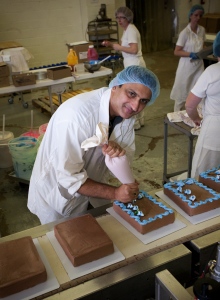
Photo by Sandra Strangemore
As far as personal career shifts go, Alok Razdan’s story really takes the cake in more ways than one—having gone from crunching numbers as a registered CA (chartered accountant) years ago to churning out close to a half-million of nut-free, high-quality cakes per year as owner and president of The French Oven commercial bakery in west-end Toronto.
“I actually got my start in the food business while living abroad working for Coca-Cola as a regional controller—becoming responsible for six of their bottling facilities,” Razdan told Canadian Packaging on a recent visit to the tidy, 15,000-square-foot production plant employing 15 people to produce 450,000 fresh and frozen cakes per year for retail and private-label customers across Ontario and western Canada.
“I used my experience there as an opportunity to learn everything I could about sales, marketing and production—essentially, how to run a business,” relates Razdan, whose return to Canada in 2005 coincided with a timely business opportunity to acquire a reputable up-for-sale baked goods producer with 18 years worth of successful recipes and loyal customers.
“I didn’t know a lot about baked goods at that time,” he recalls, “but I did my due diligence and research, maintained the recipes already utilized by the previous owners, and then streamlined the production process to run in a more lean and effective manner.
“It’s not like the business was losing money when I bought it—I just saw ways of making things run more effectively which, when put into effect, helped us to operate better.”
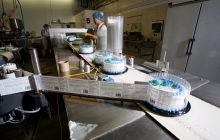
Photo by Sandra Strangemore
In addition Razdan’s wife, who is an equal partner in the company, is a professional cake decorator who takes an active part in creating new ideas and recipes, while also aiding in product development for The French Oven customers.
While the company is not the only local niche supplier of nut-free cakes—made specifically for consumers allergic to nut-containing food products and ingredients—no one else in Canada does it quite on the same scale, or offering the broad variety of tantalizing recipes, that The French Oven does, Razdan contends.
“Along with manufacturing cupcakes and wedding cakes, customized if necessary, our menu includes over 100 different high-quality cakes—from the very decadent Black Forest and Chocolate Fudge to melt-in-your-mouth cheesecakes and mousse,” Razdan explains.
“And we do it all in a nut-free facility that has allowed us to become a niche-market, large-scale supplier catering to the needs of people suffering from nut allergies.”
Naturally, the company staff makes it an ongoing priority to maintain a strict and uncompromising facility regime with exacting procedures to keep it nut-free at all times: ensuring the product received from its suppliers is nut-free; using an allergen checklist for each and every ingredient used in production; and providing regular training for its employees in Good Manufacturing Practices.
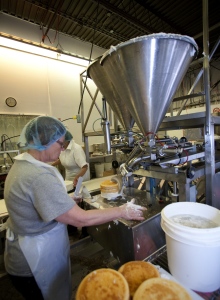
Photo by Sandra Strangemore
SERIOUS BUSINESS
“It is very important—people can become seriously ill, or even die, from nut-allergy reactions.
“We take our responsibilities as a nut-free facility very seriously,” Razdan asserts. “We want to ensure that everyone out there can join in and enjoy our cakes.”
In addition to nut-free products, the company also produces a range of egg-free cakes for consumers who shun eggs for dietary or religious reasons, Razdan confides, pointing out that none of the company’s products contain any animal fats or alcoholic flavorings, and that only non-dairy whips are used for topping and decorating the cakes.
Such strict adherence to quality assurance has served The French Oven well in terms of a growing customer base in recent years.
When Razdan purchased the company, most of its business was done with discount retailers such as Food Basics and Price Chopper, whereas today the company also counts prominent regional retailers like Galati Brothers supermarkets among prominent new clients for its flagship brands.
The company also supplies a diverse range of fresh-baked goods for pick-up or delivery to various restaurants and eateries in the GTA (Greater Toronto Area) region, Razdan relates, and has recently commenced co-packing a private-label store brand for the retailing giant Walmart Canada.
“The cakes produced here are sold all over Ontario, and we service all the Walmart Canada stores to the west across Canada,” says Razdan, adding that he’s working on plans for further market expansion into eastern Canada and the U.S. in due time.
The typical cake production process at The French Oven begins with mixing the ingredients, baking sponge cakes on-site, and placing them into a fridge overnight—to cool down and make them easier to slice horizontally.
After they have been cooled and sliced, the sponge cake slabs are placed onto a tray and on a Unifiller depositer machine—manufactured by Delta, B.C.-based Unifiller Systems Inc.—which proceeds to apply neat and precise deposits of icy filling between the two slabs to form the layers into a structured shape.
After that, the cakes move on to Unifiller’s Border Master enrobing machine—claimed to be the world’s only computerized bordering system that frosts the top and sides of the cake—before, depending on complexity, the cake is decorated with all the final design flourishes by hand.
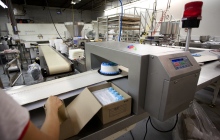
Photo by Sandra Strangemore
After frosting, the cakes are placed onto a tray on a Rapistan conveyor, which swiftly whisks them on for final product inspection—administered at high speeds by the SuperScan Micro metal det
ection system, manufactured by Loma Systems.
After the cakes pass through the metal detector, a plant employee adds whatever more decorations or final touches are required by hand, places a domed PET (polyethylene terephthalate) lid over the finished creation, and attaches a plastic seal band to the base of the dome—connecting it to the base tray as it is conveyed down the line for labeling.
Because appearances play such an important part in product presentation in the cake business, a year ago Razdan decided to invest in a reliable, high-performance labeling system that would do justice to the product by producing high-quality, professional-looking, uniform product labels for inline application to the PET domes.
After making inquiries in the marketplace, Razdan decided to try out an Alpha 86 LS labeling system proposed by Weber Marking Systems Canada, the Canadian subsidiary of global labeling technologies manufacturer Weber Marking Systems, Inc., located in nearby Mississauga, Ont.
“When I was looking for a robust labeler to take care of our growing production needs with the new Walmart co-packing work,” Razdan recalls, “Weber offered me a great price for the equipment if I would purchase pre-printed labels from them for a year.
“Well, the year came and went, and I elected to stay with Weber’s label deal because their pricing was still fantastic.”
Installed last year, the Alpha 86 label applicator has proved itself to be a highly efficient combination of speed and precision with a highly repeatable process of applying preprinted, pressure-sensitive labels whereby the label stock is automatically peeled from the backer lining and affixed, gently but firmly, onto the side of the PET dome shell.
Constructed from heavy-duty aluminum to withstand applications in harsh industrial environments, the Alpha 86 system can apply labels measuring up to 4.72-inches-wide (11.99 cm) and up 39 inches (99.06 cm) in length at speeds from 80 to 200 feet per minute, according to Weber, with a ±0.03 inch placement accuracy on either the top, sides, or bottom of a product.
Razdan says he has been very impressed with the reliable and consistent labeling performance provided by the Alpha 86 system, which incorporates flexible stepper motor technology to ensure top-notch labeling accuracy and eliminate common production line errors such as skipping or double-labeling.
“Of course it wasn’t just the great pricing that Weber offered us,” Razdan remarks, adding that Weber also supplies the plant with blank labels that it prints on a model CL412e desktop printer from Sato America, Inc. for some of its own branded products.
“I continued with Weber’s offer because the Alpha 86 provides us with a high-quality label that both my customers and myself are happy with,” Razdan states.
After the label has been applied to the domed lidding, the cakes travel through a shrink tunnel, manufactured by Damark Shrink Packaging Systems, which heatshrinks the pre-applied plastic seal band to the tray and dome—completely ensuring that no foreign particles, debris or contaminants can get inside the package.
FRESH THINKING
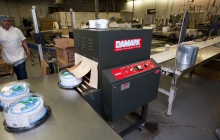
Photo by Sandra Strangemore
“For us, freshness is paramount,” states Razdan. “You can make the tastiest cakes on the planet, but it’s all for naught if they’re not packaged in a manner that maintains their freshness.
“Our Damark shrink tunnel has worked very well for us in this respect,” Razdan says, noting that the shelf-life of his company’s products varies from one week under proper refrigeration up to three months if frozen.
While Razdan acknowledges that the cake business is fraught with fierce competition, especially during tough economic times, paying attention to unfolding consumer trends plays a key part in helping The French Oven stay ahead of the chasing pack.
“All businesses need to not only research their own market, but to keep following up on that research to ensure they don’t get left behind,” Razdan explains.
But paying attention to the market must also go hand-in-hand with staying on top of the latest production and packaging technologies in ensuring long-term competitive success, Razdan advises.
“It definitely helps a great deal to be properly informed on the production equipment available for your particular industry,” he sums up.
“That’s why I feel quite confident in stating that the equipment we have here, including the Weber label applicator, have all been excellent investments that helped make our already delicious products even more appealing for our customers.”
Advertisement

